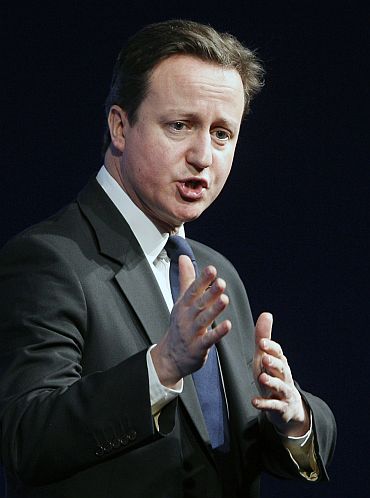 Britain's experiment with multiculturalism has "failed" to prevent the radicalisation of Muslims by hindering their integration into the British society, Prime Minister David Cameron said on Saturday.
Britain's experiment with multiculturalism has "failed" to prevent the radicalisation of Muslims by hindering their integration into the British society, Prime Minister David Cameron said on Saturday.
In his first speech on radicalism and causes of terrorism, the prime minister said a "hands-off tolerance" of those who reject Western values had failed to prevent the rise of Islamic extremism in Britain. In the major speech at the International Conference on Security Policy in Munich, the Conservatives' leader Cameron attacked the Labour's experiment with multiculturalism and argued in favour of developing a "muscular liberalism".
Cameron also said UK must ban preachers of hate from coming to the country while make Britain "a lot less" tolerant to Islamic extremists who whip up hatred against the West.
He said Britain has "even tolerated these segregated communities behaving in ways that run counter to our values", a policy that needs to be revised.
"We need a lot less of the passive tolerance of recent years and much more active, muscular liberalism... We must ban preachers of hate from coming to our countries," he said, spelling out ways of tackling all forms of extremism.
Cameron also suggested that there should be greater scrutiny of Islamic groups that get public money but do little to tackle extremism. "Let's properly judge these organisations: Do they believe in universal human rights - including for women and people of other faiths? Do they believe in democracy and the right of people to elect their own government? Do they encourage integration or separatism?" he said.
"We must also proscribe organisations that incite terrorism -- against people at home and abroad," he said. Cameron said what is needed is the strengthening of national identity and allowing people to say "I am a Muslim, I am a Hindu, I am a Christian, but I am a Londoner... too".
"Frankly, we need a lot less of the passive tolerance of recent years and much more active, muscular liberalism," the prime minister said.
"Governments must also be shrewder in dealing with those that, while not violent, are certainly in some cases, part of the problem. We need to think much harder about who it's in the public interest to work with," he said.
The Prime Minister said some organisations that seek to present themselves "as a gateway to the Muslim community" were being showered with public money despite doing little to combat extremism. "As others have observed, this is like turning to a right-wing fascist party to fight a violent white supremacist movement," he said
As Britain scrambles for ways to handle the problem of home-grown extremists, a phenomenon that is worrying the country for some years now, Cameron said the country needs to be less tolerant and more judgemental when faced with ideologies that threaten its basic values.
His statements came just days after Britain's independent reviewer of anti-terrorism laws, Lord Cartile, said that human rights rulings had made Britain a "safe haven" for suspected foreign terrorists.
Cameron said the society has failed to provide a strong sense of what it means to be British, making it easier for extremists to prey on youngsters seeking something to identify with.
"Under the doctrine of state multiculturalism, we have encouraged different cultures to live separate lives, apart from each other and the mainstream. We have failed to provide a vision of society to which they feel they want to belong.
He said this "hands-off tolerance" has only served to reinforce the sense that not enough is shared.
"All this leaves some young Muslims feeling rootless. And the search for something to belong to and believe in can lead them to this extremist ideology," he said.
The comments did not go down well with Muslim groups, some of whom said the community had been singled out as part of the problem. Reacting to the speech, Muslim Council of Britain's assistant secretary general Faisal Hanjra said the stance was a disappointment and signalled no positive change in the new government's approach to tackling the problem of extremism.
"We were hoping that with a new government, with a new coalition that there'd be a change in emphasis in terms of counter-terrorism and dealing with the problem," he said.
"Again it just seems the Muslim community is very much in the spotlight, being treated as part of the problem as opposed to part of the solution," he was quoted as saying.
Calling for tough measures against groups that are seen as promoting extremism, Cameron said ministers should refuse to engage with such groups, they should be denied access to public funds and barred from spreading their message in universities and prisons.
Cameron said Britain should actively promote its ideals of democracy, equal rights and freedom of worship and speech and the establishment should make it clear enough to all its citizens that to belong in the country they would have to believe these things.
But, he also made a clear distinction between Islam and Islamic extremism, which he said attracted people who feel "rootless" within their own countries, BBC said.
Muslim youth group The Ramadhan Foundation too was disappointed with Cameron's statements, which it said sought to suggest that the community has not signed up to the values of tolerance and freedom and this was offensive and incorrect.
Referring to developments in Egypt, Cameron said: "We want to see the transition to a more broadly based government with the proper building blocks of a free and democratic society".
Image: UK PM David Cameron






 © 2025 Rediff.com -
© 2025 Rediff.com -